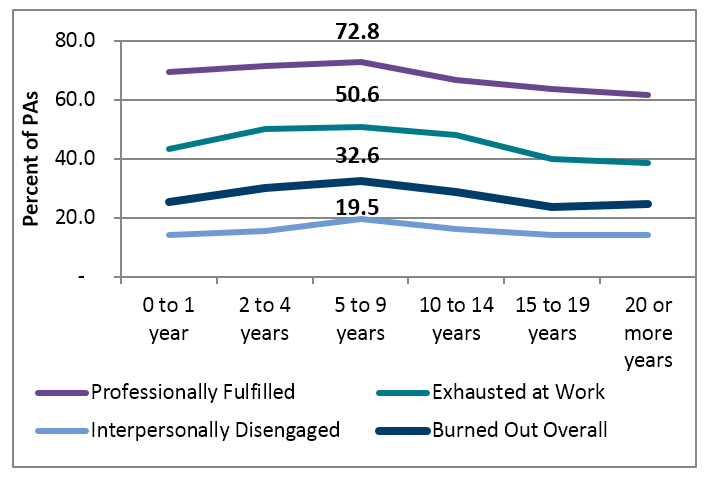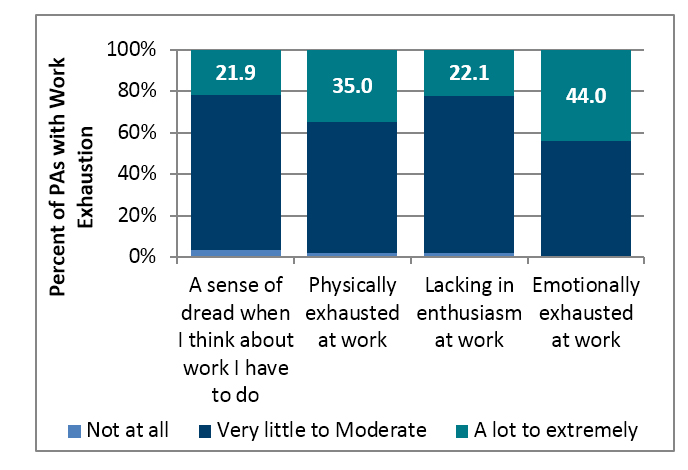Are PAs Burned Out?
Emergency Medicine PAs Have Highest Rates of Burnout
May 4, 2018
By AAPA Research Department
Burnout is characterized by emotional exhaustion, lack of enthusiasm for work, reduced sense of personal accomplishment, and cynicism. Burnout represents a long-term response to emotional and interpersonal stressors of a job.1 It is important to monitor as burnout is correlated with medical errors, job turnover, substance abuse, and suicidal ideation. Furthermore, evidence shows that rates among physicians have been increasing.2 AAPA’s 2018 Salary Survey data offers a look at how PAs are feeling about their work and stressors relating to work.
Most PAs are happy at work
In 2018, 15% of PAs said that the statement “I feel happy at work” was completely true of them. Those who checked “I feel happy at work” as moderately to completely true increased to 80%.

Measures of burnout are highest among PAs with 5 to 9 years’ experience.
As measured by the Professional Fulfillment Index (PFI)3 in 2018, PAs with 5 to 9 years’ experience have the highest rates of exhaustion at work (50.6%, ranging from 38.5% to 50.6%) and interpersonal disengagement (19.5%, ranging from 14.1% to 19.5%) with 32.6% considered burned out (ranging from 24.8% to 32.6%).
At the same time, PAs with 5 to 9 years of experience also have the highest rates of professional fulfillment 9 (72.8%, ranging from 61.5% to 72.8%).
PAs in emergency medicine have the highest rates of burnout

Across all measures of burnout, PAs in emergency medicine reported the highest rates (34.5% of all PAs, ranging from 20.2% to 34.5%), including exhaustion at work (50.8%) and interpersonal disengagement (21.5%). Despite this, PAs are fulfilled by the work they perform. Emergency medicine PAs have the highest rates of professional fulfillment (72.3%).
Physical and emotional exhaustion is not uncommon for PAs
Overall, 46.2% of PAs were exhausted at work. Among those who met the threshold for work exhaustion, a pattern emerges. One in three (35.0%) of these PAs rated their level of impact of physical work exhaustion from a lot to extreme and 44.0% rated their emotional exhaustion the same! Other factors for work exhaustion include having a sense of dread about work to be done (21.9% rated it a lot or extreme) and lacking in enthusiasm at work; 22.1% rated it a lot or extreme.

Stress at work is causing PAs to consider quitting their current job.
In 2017, PAs were asked if stress had ever caused them to quit their job. One in eight PAs said that they were currently considering quitting due to stress! Women were more likely to report that this was the case (women=14.2%, men= 10.2%, all PAs=12.8%).
PA burnout can cost employers $100,000 to $250,000 per PA leaving.
Employers need to consider not just the cost of recruiting and training new PAs. There is lost opportunity cost when their PA quits and before a new PA is hired, as well as the cost related to lost productivity when a new PA learns the systems unique to the employer. If every PA who was thinking about quitting due to stress quit, the economic impact on employers would be over $2 BILLION dollars.
References
- Maslach C, Schaufeli WB, Leiter MP. Job burnout. Ann Rev Psychol. 2001;52(1):397-422. doi: 10.1146/annurev.psych.52.1.397
- Shanafelt T, Hasan O, Dyrbye LN, Sinsky C, Satele D, Sloan J, West CP. Changes in burnout and satisfaction with work-life balance in physicians and the general US working population between 2011 and 2014. Mayo Clinic Proceedings. 2015;90(12):1600-1613. doi: http://dx.doi.org/10.1016/j.mayocp.2015.08.023
- Trockel M, Bohman B, Lesure E, Hamidi MS, Welle D, Roberts L, Shanafelt T. A Brief Instrument to Assess Both Burnout and Professional Fulfillment in Physicians: Reliability and Validity, Including Correlation with Self-Reported Medical Errors, in a Sample of Resident and Practicing Physicians.Acad Psychiatry. 2018;42(1):11-24. doi: 10.1007/s40596-017-0849-3
More resources
2017 AAPA Salary Report
About the data
Data on burnout and the Professional Fulfillment Inventory are derived from the 2018 AAPA Salary Survey. Data on PAs quitting due to stress are derived from the 2017 AAPA Salary Survey.
Author is Noël Smith, MA, AAPA’s senior director of research. Contact her at [email protected].
Thank you for reading AAPA’s News Central
You have 2 articles left this month. Create a free account to read more stories, or become a member for more access to exclusive benefits! Already have an account? Log in.



